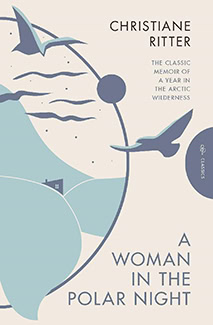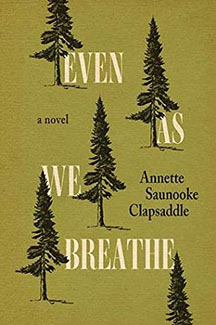I have affiliate relationships with Bookshop.org and Malaprop's Bookstore in beautiful Asheville, NC. I will earn a small commission at no additional cost to you if you purchase merchandise through links on my site. Read more on my affiliate page.

Title: A Woman in the Polar Night
Author: Christiane Ritter
Translator: Jane Degras
Genre: Memoir, Exploration, Travel, Translation, Classic
Audience: Adult
Content Warning: Hunting for food and for furs to sell
My Review:
I am drawn to stories set in the coldest reaches of our planet. Don’t ask me why, because I complain bitterly if it’s 40° F (4° C) outside. I would never make it in the coldest parts of the mainland US, much less on a ship plowing through polar ice. Maybe I’m just trying to understand a mentality that’s so different from my own.
So many of those sorts of memoirs and biographies are written by and about men though. There have to be women out there too. I’ve read one book about a woman surviving a shipwreck on the pack ice off the coast of Alaska (Ada Blackjack by Jennifer Niven). But surely there are more? When I stumbled on A Woman in the Polar Night at a bookstore, I knew I had to have it.
This is a slim volume and much of it is taken up with Mrs. Ritter, her husband, and his friend Karl’s day-to-day survival in Svalbard (Formerly Spitsbergen). Fair warning, that survival isn’t really for those who are disturbed by hunting for food and for furs to sell. Just trying to keep wood chopped and clearing the entry to the tiny hut they were sharing were almost full-time jobs. These events happened in 1934 so they didn’t have the lightweight, ultra-warm sleeping bags and clothes that we take for granted now. They had a broken stove that spewed soot constantly. The inside of their hut was encased in ice. They prayed for the pack ice to come and bring the polar bears and seals they needed to survive. They endured storms that lasted for a week at a time. The endless night made “Chrissie” restless so that the two men feared she would be moonstruck and throw herself into the polar sea. Hunters had been known to do it. It’s a harsh life.
And yet.
Mrs. Ritter eventually writes about the place with awe and wonder. It takes her a while to settle in. Her husband and Karl have been on Svalbard for a few years, I believe. (Those details are sparse, as are details about their life in Austria.) She starts to see how small humans really are on this planet we share with so many other creatures. She starts to see what really matters and what doesn’t in the fripperies of “civilized” European life. And those are the parts that really shone for me.
She ends up spending a full year on Svalbard but the biggest part of the book is about winter. Which is probably because so much of the year is winter in that far northern clime. Having spent three summer months in Alaska myself, I was hoping that she would write more about the light and returning wildlife in those magical months but she doesn’t have much to say about any of that.
The translation by Jane Degras is beautifully done for the most part. But Mrs. Ritter writes often about her group’s need for “vitamins” and that seems like an odd word to use so frequently. Maybe nourishment or sustenance could have been substituted sometimes? But no, it’s always vitamins, which, for this 21st-century armchair explorer, made me think for a fraction of a split second that they were looking for gummy vitamins.
I’ll end my actual review here and say that I highly recommend this to experience a place and a way of life that are utterly foreign to so many of us.
Quotes from the Book:
“Confronted with such an Arctic storm, every human being becomes primitive again, small and full of foreboding. The vengeful gods return. Conscience awakes and hurls itself at men like a monster.”
“I am conscious of the immense solitude around me. There is nothing that is like me, no creature in whose aspect I might retain a consciousness of my own self; I feel that the limits of my being are being lost in this all-too-powerful nature, and for the first time I have a sense of the divine gift of companionship.”
“I have a better understanding now of what my husband meant when he said, ‘You have to be alone in the Arctic to know what living in the Arctic really means.’ Perhaps in centuries to come men will go to the Arctic as in biblical times they withdrew to the desert, to find the truth again.”
“The Eskimos have given a beautiful interpretation of the mysterious undulation of the [Northern Lights]. They believe that they can see the spirits of their departed in its drifting veils. This serene light has in it something that yearns toward the earth, something sheltering, consoling, promising, and yet utterly mute in its remoteness.”
“It is full moon. No central European can have any idea of what this means on the smooth frozen surface of the earth. It is as though we were dissolving in moonlight, as though the moonlight were eating us up. It makes no difference when we go back into the hut under the snow after a moonlight trip. The light seems to follow us everywhere. One’s entire consciousness is penetrated by the brightness; it is as though we were being drawn into the moon itself.”
“The immense silence of the land surrounds me and invades me, submerging and annihilating my human smallness.”
“No, the Arctic does not yield its secret for the price of a ship’s ticket. You must live through the long night, the storms, and the destruction of human pride. You must have gazed on the deadness of all things to grasp their livingness. In the return of light, in the magic of the ice, in the life-rhythm of the animals observed in the wilderness, in the natural laws of all being, revealed here in their completeness, lies the secret of the Arctic and the overpowering beauty of its lands.”
Synopsis from GoodReads:
This rediscovered classic memoir tells the incredible tale of a woman defying society’s expectations to find freedom and peace in the adventure of a lifetime.
In 1934, the painter Christiane Ritter leaves her comfortable life in Austria and travels to the remote Arctic island of Spitsbergen, to spend a year there with her husband. She thinks it will be a relaxing trip, a chance to ‘read thick books in the remote quiet and, not least, sleep to my heart’s content’, but when Christiane arrives she is shocked to realize that they are to live in a tiny ramshackle hut on the shores of a lonely fjord, hundreds of miles from the nearest settlement, battling the elements every day, just to survive.
At first, Christiane is horrified by the freezing cold, the bleak landscape the lack of equipment and supplies… But as time passes, after encounters with bears and seals, long treks over the ice and months on end of perpetual night, she finds herself falling in love with the Arctic’s harsh, otherworldly beauty, gaining a great sense of inner peace and a new appreciation for the sanctity of life.
Similar Books:
If you liked A Woman in the Polar Night you might also like my reviews of
- Ada Blackjack: A True Story of Survival in the Arctic by Jennifer Niven
- In the Kingdom of Ice: The Grand and Terrible Polar Voyage of the USS Jeannette by Hampton Sides
- Into Thin Air: A Personal Account of the Mount Everest Disaster by Jon Krakauer
Reading Challenge:
Purchase:
Buy A Woman in the Polar Night from Malaprop’s Bookstore in beautiful Asheville, NC or








2 Comments
You are so right that there were surely women explorers and adventurers, but their tales are often not told. I love that you found a book that covers both the winter survial story that you so enjoy and it’s a woman.
I was so excited to stumble on this book in the bookstore!